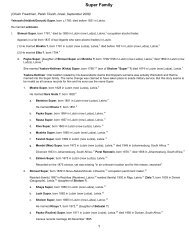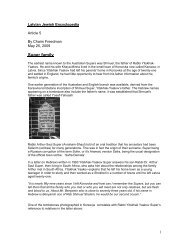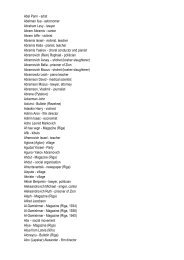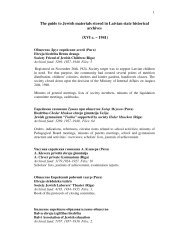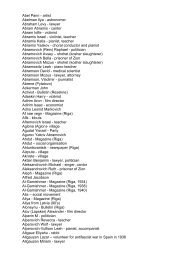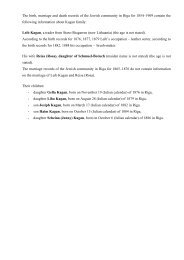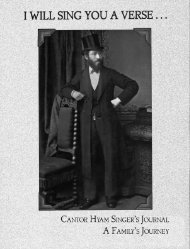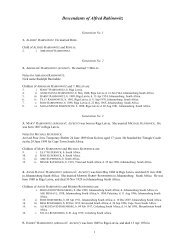Small Riga Ghetto
Small Riga Ghetto
Small Riga Ghetto
You also want an ePaper? Increase the reach of your titles
YUMPU automatically turns print PDFs into web optimized ePapers that Google loves.
254<br />
ing: "When the bell rings, the work's over!" I had overheard a German saying<br />
quite openly that the Russian army's vanguards had broken through and were<br />
now only a few hundred kilometers from Magdeburg. I kept it to myself, for<br />
after I had told a comrade he had simply laughed at me. So I told them to work<br />
"hard" - after all, we had to win the war!<br />
When I worked on fortifications, I was always lucky. It was that way in<br />
<strong>Riga</strong> too: the enemy bypassed the city and my fortifications stood firm. I<br />
hoped the same thing would happen again in Magdeburg. And indeed, I was<br />
lucky once more. The Americans made a detour around the town, and our<br />
months of work were all in vain. We had to fortify not only the bridges but<br />
also the access roads. For this purpose, heavy steel beams were dragged out of<br />
the bombed houses. Once as we were working in the wrecked houses we<br />
"strolled" through a hole in a cellar in hopes of "organizing" something there.<br />
We found a tremendous amount of loot, for the Germans had stored huge<br />
amounts of food in their cellars. There were some excellent items: puddings<br />
and first-class drinks. Everything had to be eaten as fast as possible. The only<br />
thing we could take with us was potatoes. Sometimes we found potatoes already<br />
roasted by the conflagration. But it was dangerous to take even potatoes<br />
back into the camp. Our murderers in the camp had heard about it, and when<br />
we returned they searched us thoroughly and gave us a terrible beating. Some<br />
of us will not forget how often we bled for those potatoes. "Strolling around"<br />
in the bombed-out cellars meant death in any case, for signs hung everywhere<br />
to the effect that looting was punishable by death. So we were risking our lives<br />
to get something to eat. One great advantage of our new work was that at the<br />
NSDAP work detail we received an extra bowl of soup at midday. In a word,<br />
it was worth the effort.<br />
Because some sections of the factory were still operating, not all of us could<br />
get into a work crew in the town. In any case, the situation at the camp eased<br />
significantly, and everyone tried hard to get into the fortification work crews.<br />
Besides the crew working on the Hindenburg Bridge, which we called "the<br />
long tour", there was also a second work crew, "the short tour", which<br />
worked on the Hitler Bridge. We went to work in the town without tools. Only<br />
on the way there, in the courtyard of NSDAP headquarters, were shovels and<br />
other tools handed out to us, and we had to give them back when we returned.<br />
Shouldering our tools like weapons, we marched through the town singing. We<br />
sang Soviet songs in Russian. In our group, the song "Bej wintowka, po<br />
golowkie bezposzczadno po wragu" (Shoot mercilessly with your rifle at your<br />
enemy's head) and the well-known song "Katjuscha" were great hits. But the



